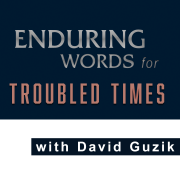“Worship The Right Way” – 2 Samuel 6:12b-15 – June 13 2020
/0 Comments/in Enduring Words for Troubled Times/by David Guzik“The Sound in the Mulberry Trees” – 2 Samuel 5:23-25 – June 12 2020
/0 Comments/in Enduring Words for Troubled Times/by David Guzik“This is David’s Spoil” – 1 Samuel 30:18-20 – June 11 2020
/0 Comments/in Enduring Words for Troubled Times/by David Guzik“The Work of God Goes On” – 1 Samuel 25:1 – June 10 2020
/0 Comments/in Enduring Words for Troubled Times/by David Guzik“In Distress, In Debt, Discontent” – 1 Samuel 22:1-2 – June 9 2020
/0 Comments/in Enduring Words for Troubled Times/by David GuzikDie Macht von Gottes Wort
/0 Comments/in Wöchentliche Andacht/by David GuzikUnd Hilkija, der Hohepriester, sprach zu Schaphan, dem Schreiber: Ich habe das Buch des Gesetzes im Haus des Herrn gefunden! Und Hilkija übergab Schaphan das Buch, und er las es. . . Dann berichtete Schaphan, der Schreiber, dem König und sprach: Der Priester Hilkija hat mir ein Buch gegeben! Und Schaphan las es vor dem König. (2. Könige 22,8 und 10).
In 2. Könige 22 beginnt die Geschichte von Josia, einem der besseren Könige Judas. Zu seiner Zeit gab es eine Umkehr und eine wunderbaren Erweckung in Jerusalem und ganz Juda. Hier lesen wir, dass alles damit begann, dass sie das Buch des Gesetzes im Haus des Herrn fanden.

Es ist so traurig, dass sie Gottes Wort vorher verloren hatten – dass es gefunden werden musste. 5. Mose 31,24-27 zufolge musste eine Kopie dieses Buchs des Gesetzes neben der Bundeslade liegen. Das Wort Gottes war mit Israel, doch es wurde weitestgehend abgelehnt.
Es wurde so sehr abgelehnt, dass in 2. Könige 22,8 steht: er las es. Es ist bemerkenswert, dass das überhaupt erwähnt wurde – der Hohepriester fand Gottes Wort und ein Schreiber las es. Das war so neu, dass es aufgeschrieben wurde!
Noch besser: Schaphan las es vor dem König. Wir sehen, dass Gottes Wort sich verbreitete. Es war vergessen worden und wurde als altes, verstaubtes Buch angesehen. Nun war es gefunden worden, wurde gelesen und verbreitet. Nun sollten wir eine geistliche Erweckung und Erneuerung erwarten.
Durch die ganze Geschichte von Gottes Volk, folgt immer, wenn Gottes Wort entdeckt und verbreitet wurde, darauf eine geistliche Erweckung. Es kann so einfach beginnen wir hier bei Josia, indem ein Mann das Buch findet, liest, daran glaubt und es verbreitet.
Ein weiteres Beispiel dafür sehen wir in der Geschichte des Peter Waldo und seinen Nachfolgern. Waldo war ein reicher Kaufmann, der im 12. Jahrhundert sein Geschäft aufgab, um Jesus radikal nachzufolgen. Er stellte zwei Priester ein, die das Neue Testament in Alltagssprache übersetzen sollten und benutzte dies, um andere zu lehren. Er lehrte auf der Straße und wann immer ihm jemand zuhören wollte.
Viele Menschen kamen, um ihm zuzuhören und begannen, Jesus nachzufolgen. Er lehrte die Texte des Neuen Testaments in Alltagssprache und wurde von der Kirche dafür getadelt. Doch er ignorierte das und machte weiter. Er schickte seine Nachfolger zu zweit in Dörfer und auf Marktplätze, um zu lehren und die Schrift zu erklären.
Die Schriften wurden von ihnen auswendig gelernt, und manche konnten das ganze Neue Testament und große Teile des Alten Testaments auswendig. Das Wort Gottes – wenn es gefunden, gelesen, geglaubt und verbreitet wird – hat die Macht, Dinge zu verändern. Lies es und glaube daran!
El poder de la palabra de Dios
/0 Comments/in Devocional Semanal/by David GuzikEntonces dijo el sumo sacerdote Hilcías al escriba Safán: He hallado el libro de la ley en la casa de Jehová. E Hilcías dio el libro a Safán, y lo leyó … Asimismo el escriba Safán declaró al rey, diciendo: El sacerdote Hilcías me ha dado un libro. Y lo leyó Safán delante del rey. (2 Reyes 22:8, 10)
2 Reyes 22 comienza la historia de Josías, uno de los mejores reyes de Judá. Durante su tiempo, hubo un arrepentimiento y un avivamiento maravilloso en Jerusalén y toda Judá. Estos versículos nos muestran que comenzó cuando hallaron el libro de la ley en la casa de Jehová.

Es triste pensar que alguna vez perdieron la palabra de Dios, que el libro tenía que ser hallado. Según Deuteronomio 31:24-27, debía haber una copia de este libro de la ley al lado del arca del pacto, comenzando en los días de Moisés. La palabra de Dios estaba con Israel, pero fue muy descuidada en aquellos días.
Era tan descuidada que 2 Reyes 22:8 nos tiene que decir que lo leyó. Parece notable que esto fuera digno de mención: que el sumo sacerdote encontró la palabra de Dios y un escriba la leyó. ¡Era una noticia sobre la que valía la pena escribir!
Mejor aún, lo leyó Safán delante del rey. Vemos que la palabra de Dios se dispersó. Había sido olvidada y considerada como nada más que un libro viejo. Ahora fue encontrada, leída y compartida. Debemos esperar el avivamiento espiritual y la renovación a seguir.
A través de la historia del pueblo de Dios, cada vez que la palabra de Dios es recuperada y difundida, sigue avivamiento espiritual. Puede comenzar tan simple como lo hizo en los días de Josías, con un hombre encontrando y leyendo, creyendo y compartiendo el Libro.
Otro ejemplo de esto en la historia se ve en la historia de Peter Waldo y sus seguidores, a veces conocidos como Waldenses. Waldo fue un comerciante rico que vivió en el siglo XII y renunció a su negocio para seguir radicalmente a Jesús. Contrató a dos sacerdotes para traducir el Nuevo Testamento al lenguaje común y, utilizando, comenzó a enseñar a otros. Enseñaba en las calles o donde pudiera encontrar a alguien que lo escuchara.
Mucha gente común vino a escucharlo y comenzó a seguir radicalmente a Jesucristo. Waldo les enseño el texto del Nuevo Testamento en el lenguaje común y fue reprendido por los funcionarios de la iglesia por ello. Él ignoró la reprimenda y continuó enseñando, eventualmente enviando a sus seguidores de dos en dos a pueblos y mercados, para enseñar y explicar las Escrituras.
Las Escrituras fueron memorizadas por los Waldenses, y no era inusual que sus ministros memorizaran todo el Nuevo Testamento y grandes secciones del Antiguo Testamento. La palabra de Dios –cuando se encuentra, se lee, se cree y se difunde– tiene este tipo de poder transformador. ¡Léela y créela hoy!



